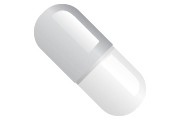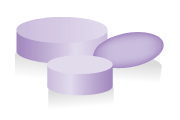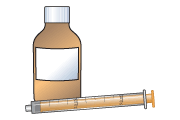Sodium bicarbonate for acidosis
This leaflet is for parents and carers about how to use this medicine in children. Our information may differ from that provided by the manufacturers, because their information usually relates to adults. Read this leaflet carefully. Keep it somewhere safe so that you can read it again.
Name of medicine
Sodium bicarbonate
This leaflet is about the use of sodium bicarbonate for acidosis (too much acid in the body).
Why is it important for my child to take sodium bicarbonate?
Severe acidosis causes sickness, fast breathing and bad breath, although not all children have these symptoms. Sodium bicarbonate is an alkali (the opposite to an acid). It decreases the acid level in your child’s body and so reduces acidosis.
What is sodium bicarbonate available as?
- Capsules: 500 mg (approximately 6 mmol each of sodium and bicarbonate)
- Tablets: 600 mg (approximately 7 mmol each of sodium and bicarbonate)
- Liquid medicine can be ordered specially from your pharmacist
When should I give sodium bicarbonate
The sodium bicarbonate is usually given twice each day. Give one dose in the morning and one in the evening. Ideally these times are 10–12 hours apart. For example, this could be between 7am and 8am and between 7pm and 8pm.
Your doctor may want you to give sodium bicarbonate to your child more often than this – they will explain what to do.
Give the medicine at about the same time(s) each day so that this becomes part of your child’s daily routine, which will help you to remember.
How much should I give?
Your doctor will work out the amount of sodium bicarbonate (the dose) that is right for your child. The dose will be shown on the medicine label.
It is important that you follow your doctor’s instructions about how much to give.
How should I give sodium bicarbonate?

Capsules
You can open the capsules and mix the contents with a small amount of soft food such as yogurt or jam. Make sure your child swallows it straight away, without chewing.
- Capsules should be swallowed with a glass of water, squash or juice. Your child should not chew the capsule.

Tablets
- Tablets should be swallowed with a glass of water, squash or juice. Your child should not chew the tablets.
- You can crush the tablet and mix it with a small amount of soft food such as yogurt, honey, or mashed potato. Make sure your child swallows it straight away, without chewing.

Liquid medicine
- Shake the medicine well. Measure out the right amount using an oral syringe or a medicine spoon. You can get these from your pharmacist. Do not use a kitchen teaspoon as it will not give the right amount. You can also dilute the medicine (measured with a medicine spoon) in a small amount of water or squash. Make sure your child takes it all straight away.
When should the medicine start working?
The sodium bicarbonate starts to work straight away. Any symptoms of acidosis should improve after 1-2 days (although many children do not have symptoms).
What if my child is sick (vomits)?
- If your child is sick less than 30 minutes after having a dose of sodium bicarbonate, give them the same dose again.
- If your child is sick more than 30 minutes after having a dose of sodium bicarbonate, do not give them another dose. Wait until the next normal dose.
If your child is sick again, seek advice from your family doctor, nurse, pharmacist, or hospital. They will decide what to do based on your child’s condition and the specific medicine involved.
What if I forget to give it?
If you normally give it once or twice each day: If you remember up to 6 hours after you should have given a dose, give your child the missed dose. For example, if you usually give a dose at about 7 am, you can give the missed dose at any time before 1 pm. If you remember after that time, do not give the missed dose. Wait until the next normal dose. You do not need to wake your child up to give a missed dose.
If you normally give it more than twice a day: Do not give the missed dose. Just give the next dose as usual.
What if I give too much?
If you think you may have given your child too much sodium bicarbonate, contact your doctor or local NHS services (details at end of leaflet) or take your child to hospital as they may have too much alkaline in their body. Take the medicine container or packet with you, even if it is empty. This will be useful to the doctor. Have the packet with you if you telephone for advice.
Are there any possible side effects?
We use medicines to make our children better, but sometimes they have other effects that we don’t want (side-effects).
Sodium bicarbonate does not usually cause unwanted effects (side-effects) when taken by mouth.
Side effects you must do something about
If your child becomes short of breath, and their face becomes puffy, contact your doctor straight away, as the amount of sodium may be too high. Do not give your child any more sodium bicarbonate until your doctor tells you to do so.
There may sometimes be other side effects that are not listed above. If you notice anything unusual and are concerned, contact your doctor. You can report any suspected side effects to a UK safety scheme at mhra.gov.uk/yellowcard
Can other medicines be given at the same time as sodium bicarbonate?
- You can give your child medicines that contain paracetamol or ibuprofen, unless your doctor has told you not to.
sodium bicarbonate should not be taken with some medicines that you get on prescription. It is important to tell your doctor and pharmacist about any other medicines your child is taking before starting sodium bicarbonate.
The sodium bicarbonate may affect other drugs given at the same time. If possible, wait at least 1 hour after giving sodium bicarbonate before giving any other medicines by mouth.
Check with your doctor or pharmacist before giving any other medicines to your child. This includes herbal and complementary medicines.
Is there anything else I need to know about this medicine?
Your doctor will do blood tests regularly to check the level of acid in your child’s body and whether the dose of sodium bicarbonate is right.
General advice about medicines
- Try to give medicines at about the same times each day, to help you remember.
- If you are not sure a medicine is working, contact your doctor but continue to give the medicine as usual in the meantime. Do not give extra doses, as you may do harm.
- Only give this medicine to your child. Never give it to anyone else, even if their condition appears to be the same, as this could do harm.
- If you think someone else may have taken the medicine, contact a doctor straight away.
- Make sure that you always have enough medicine. Order a new prescription at least 2 weeks before you will run out.
- Make sure that the medicines you have at home have not reached the ‘best before’ or ‘use by’ date on the packaging. Give old medicines to your pharmacist to dispose of.
Where should I keep this medicine?
Keep tablets or capsules in a cupboard, away from heat and direct sunlight. They do not need to be kept in the fridge.
- Liquid medicine may need to be kept in the fridge – this will be shown on the label.
- Keep the medicine in the container it came in.
- Make sure that children cannot see or reach the medicine.
Who to contact for more information?
Your child’s doctor or pharmacist will be able to give you more information about sodium bicarbonate and other medicines used to treat acidosis.
England: NHS 111
Tel 111
www.nhs.ukScotland: NHS 24
Tel 111
www.nhs24.scotNorthern Ireland: NI Direct
Wales: NHS 111 Wales
Tel 111
www.111.wales.nhs.ukCopyright disclaimer
Version [2]. © NPPG, RCPCH and WellChild, all rights reserved. Review by February 2020.
The primary source for the information in this leaflet is the British National Formulary for Children. For details on any other sources used for this leaflet, please contact us through our website, www.medicinesforchildren.org.uk.
We take great care to make sure that the information in this leaflet is correct and up-to-date. However, medicines can be used in different ways for different patients. It is important that you ask the advice of your doctor or pharmacist if you are not sure about something. This leaflet is about the use of these medicines in the UK, and may not apply to other countries. The Royal College of Paediatrics and Child Health (RCPCH), the Neonatal and Paediatric Pharmacists Group (NPPG), WellChild and the contributors and editors cannot be held responsible for the accuracy of information, omissions of information, or any actions that may be taken as a consequence of reading this leaflet.
